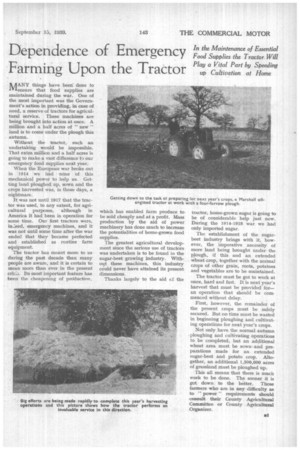Dependence of Emergency Farming Upon the Tractor
Page 27

If you've noticed an error in this article please click here to report it so we can fix it.
MANY things have been done to ensure that food supplies are maintained during the war. One of the most important was the Government's action in providing, in case of need, a reserve of tractors for agricultural service. These machines are being brought into action at once. A million and a half acres of " new " land is to come under the plough this autumn.
Without the tractor, such an undertaking would be impossible. That extra million and a half acres is going to make a vast difference to our emergency food supplies next year.
When the European war broke out in 1914 we had none of this mechanical power to help us. Getting land ploughed up, sown and the crops harvested was, in those days, a nightmare.
It was not until 1917 that the tractor was used, to any extent, for agricultural purposes, although in America it had been in operation for some time. Our first tractors were, in,:eed, emergency machines, and it was not until some time after the war ended that they became perfected and established as routine farm equipment.
The tractor has meant more to us during the past decade than many people are aware, and it is certain to mean more than ever in the present crir.:s. Its most important feature has been the cheapening of production.
which has enabled farm produce to be sold cheaply and at a profit. Mass production by the aid of power machinery has done much to increase the potentialities of home-grown food supplies.
The greatest agricultural development since the serious use of tractors was undertaken is to be found in the sugar-beet growing industry. Without these machines, this industry could never have attained its present dimensions.
Thanks largely to the aid cf the
tractor, home-grown sugar is going to be of considerable help just now. During the 1914-1918 war we had only imported sugar.
The establishment of the sugarbeet industry brings with it, how ever, the imperative necessity of more land being brought under the plough, if this and an extended wheat crop, together with the normal crops of other grain, roots, potatoes and vegetables are to be maintained. The tractor must be got to work at once, hard and fast. It is next year's harvest that must be provided for— an operation that should be corn. menced without delay.
First, however, the remainder of the present crops must be safely secured. But no time must be wasted in beginning ploughing and cultivating operations for next year's crops.
Not only have the normal autumn • ploughing and cultivating operations to be completed, but an additional wheat area must be sown and preparations made for an extended sugar-beet and potato crop. Altogether, an additional 1,500,000 acres of grassland must be ploughed up.
This all means that there is much work to be done. The sooner it is got down to the better. Those farmers who are in any difficulty as to " power " requirements should consult their County Agricultural Committee or County Agricultural Organizer.




























































